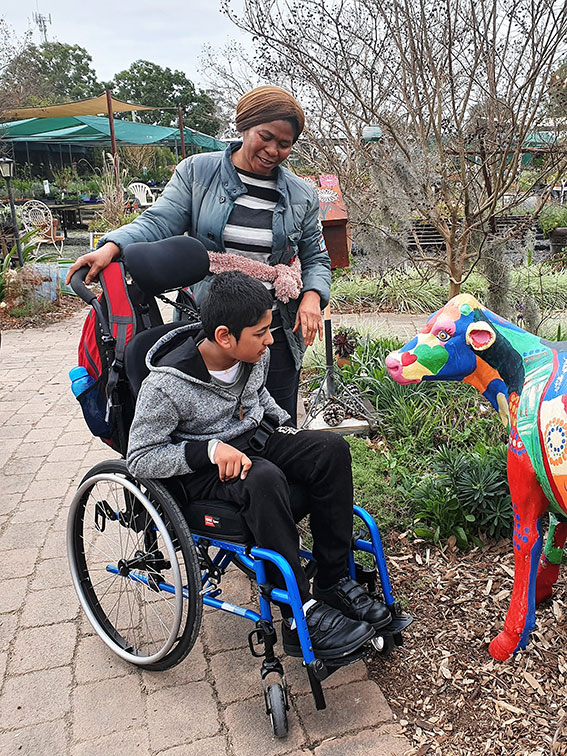Why Ndis Providers Sydney matter for families seeking disability support
Why Ndis Providers Sydney matter for families seeking disability support
Blog Article
The Important Link In Between Impairment Providers and Effective Home Treatment Solutions
The relationship in between impairment services and home care solutions is important for improving the lives of people with disabilities. Handicap services supply necessary resources and assistance. Home care options offer individualized assistance in familiar settings. This partnership promotes self-reliance and social incorporation. Yet, the specifics of exactly how these components communicate stay complex. Understanding this connection can expose brand-new understandings into improving care for those in demand. What are the effects for caregivers and individuals alike?
Recognizing Disability Services: A Summary
While lots of people might not fully understand the complexities of special needs solutions, recognizing their extent and relevance is important for promoting inclusivity. Impairment services include a large range of support systems developed to assist individuals with physical, intellectual, or developmental disabilities. These solutions purpose to boost the lifestyle, advertising self-reliance and involvement in society. They include educational programs, work assistance, transport aid, and medical care solutions tailored to individual needs.Furthermore, these solutions often entail cooperation among various stakeholders, consisting of federal government companies, non-profit companies, and neighborhood groups. This collaborative approach warranties that people get extensive support that resolves their special challenges. Recognition of handicap services is crucial, as it encourages social acceptance and the removal of preconception. By recognizing the value of these services, communities can produce a more comprehensive environment, inevitably benefiting every person and promoting level playing fields for people with impairments.
The Duty of Home Care in Sustaining People With Disabilities
Home care plays an essential function in enhancing the lives of individuals with handicaps by offering personalized assistance in acquainted atmospheres. This kind of treatment allows people to keep their independence while getting aid tailored to their certain demands. Caregivers not only use physical assistance, such as aid with everyday tasks like bathing and meal preparation, yet additionally provide emotional support and companionship.In enhancement to practical support, home treatment solutions promote social interaction, which is fundamental for mental well-being. By engaging individuals in neighborhood activities or assisting in interaction with family members and friends, caregivers help battle feelings of isolation. Home care also minimizes the problem on relative, enabling them to concentrate on their very own obligations while ensuring their liked ones receive sufficient care (Disability Services). Eventually, home care serves as a significant assistance system, encouraging people with specials needs to prosper within their own homes
Tailored Care Strategies: Fulfilling Special Requirements
Tailored treatment strategies are important for efficiently addressing the one-of-a-kind demands of individuals with disabilities. These strategies are created to offer personalized assistance, thinking about the particular challenges and choices of each individual. By performing detailed evaluations, care carriers can determine strengths and locations calling for help, guaranteeing that treatment is both appropriate and effective.Incorporating input from the private and their relative cultivates a collective approach, boosting engagement and satisfaction. Customized treatment strategies might include different solutions, such as physical therapy, job-related therapy, and individual treatment assistance, all focused on advertising overall health. Normal assessments of these treatment strategies are essential to adjust to changing requirements and conditions. This adaptability allows for timely modifications, making certain that individuals receive suitable assistance throughout their lives. Ultimately, tailored care plans function as a structure for supplying quality care that respects the dignity and uniqueness of each individual.
Enhancing Freedom Via Disability Solutions
Equipping individuals with specials needs to accomplish higher self-reliance is a main goal of impairment services. These services offer vital resources that help with self-sufficiency and enhance the lifestyle for those impacted. By supplying individualized assistance, such as movement training, flexible innovations, and life skills growth, special needs solutions allow people to navigate everyday challenges a lot more effectively.Access to community-based programs and social inclusion campaigns even more promotes self-reliance. Through these possibilities, people can participate in meaningful tasks, develop relationships, and create a sense of belonging. Additionally, details and referral solutions assist attach individuals to important sources, guaranteeing they receive the help needed to thrive.Ultimately, boosting independence via impairment solutions not only advantages individuals however also advertises an extra inclusive culture. By breaking down barriers and motivating self-advocacy, these services equip people to lead satisfying lives, adding to their communities in useful ways.
The Value of Educating for Caregivers
Educating for caretakers is important for creating important abilities that straight impact the high quality of treatment supplied to people with handicaps. By boosting their expertise and abilities, caregivers can cultivate compassionate relationships that promote trust fund and understanding. This concentrate on training not only enhances solution distribution yet also enriches the overall caregiving experience.
Necessary Ability Growth
Skill development is important for caregivers in the special needs solutions and home treatment markets. Correct training outfits caretakers with the basic abilities necessary to provide effective support and assistance to individuals with impairments. This includes understanding specific medical needs, reliable interaction approaches, and the capacity to react to different behavioral difficulties. Additionally, skill development enhances caretakers' ability to cultivate freedom in clients, ensuring they can perform daily tasks with self-respect. Continuous training also advertises self-confidence and task contentment among caregivers, reducing turn over rates in the sector. By focusing on ability development, companies can ensure that caregivers are well-prepared to fulfill the diverse needs of those they offer, eventually contributing to an extra efficient and compassionate treatment atmosphere.
Enhancing Care Top Quality
Raising the top quality of treatment for individuals with handicaps hinges on the comprehensive training offered to caretakers. Well-trained caregivers have necessary knowledge and abilities required to resolve the distinct needs of their customers effectively. Substantial training programs encompass different facets, such as comprehending disability-specific obstacles, reliable interaction techniques, and security methods. Furthermore, recurring education and learning assurances that caretakers continue to be updated on finest techniques and arising technologies in home treatment - Disability Support. This commitment to training not just boosts solution delivery but likewise promotes a feeling of self-confidence amongst caregivers, which translates into enhanced care high quality. Inevitably, spending in caretaker training is vital for creating an environment where individuals with impairments get the alert, considerate, and reliable treatment they are entitled to
Building Compassionate Relationships

Constructing a Helpful Setting at Home

Accessible Home Modifications
Lots of people with handicaps face considerable challenges in navigating their home atmospheres, making easily accessible home alterations important for fostering independence and safety. These modifications can include installing ramps, widening doorways, and creating barrier-free bathrooms, thereby enabling easier access throughout the home. Additionally, including grab bars and non-slip surface areas can substantially minimize the danger of falls, promoting a more safe and secure space. Stairlifts or lifts may also be necessary for multi-level homes, ensuring that all locations are obtainable. By executing these changes, caretakers can assist produce an environment where people can navigate their spaces with self-confidence. Eventually, available home modifications play a vital function in enhancing the high quality of life for those with impairments, allowing them to grow in their own homes.
Personalized Care Program
Easily accessible home modifications prepared more for a setting where people with disabilities can prosper, yet customized support is equally essential. Customized treatment strategies play an essential function in attending to the one-of-a-kind demands of each person. These plans are established through complete analyses that go to these guys consider clinical requirements, individual choices, and day-to-day regimens. By concentrating on specific toughness and challenges, caretakers can develop strategies that cultivate freedom and boost lifestyle. Normal analyses assure that treatment plans stay relevant and effective, enabling changes as requirements alter in time. This personalized method not only boosts the experience of those obtaining treatment but also advertises a feeling of autonomy, inevitably adding to a much more supportive and empowering home setting.
Household Involvement Approaches
Household involvement is essential in developing a helpful environment for people with specials needs at home. Involving relative in treatment strategies cultivates a sense of belonging and safety and security. Effective interaction is pivotal; normal family conferences can help with conversations regarding the person's choices and needs. Furthermore, educating household participants regarding the specific specials needs can enhance understanding and empathy, leading to much better assistance. Encouraging involvement in daily activities not just strengthens connections yet also promotes independence for the person. It is very important for households to team up with disability service suppliers to develop cohesive care plans. By actively entailing relative, a nurturing environment is cultivated, inevitably boosting the lifestyle for those with impairments.
Determining the Influence of Integrated Treatment Solutions
The performance of incorporated treatment solutions can significantly influence the lifestyle for people with handicaps. Gauging this impact requires a multifaceted approach that encompasses various metrics, including health outcomes, user complete satisfaction, and cost-effectiveness. Health and wellness results can be evaluated by tracking enhancements in movement, mental health, and overall health, giving substantial evidence of care effectiveness. Customer contentment studies can catch the experiences of individuals and their families, offering understandings into the perceived quality of treatment got. Additionally, analyzing cost-effectiveness assists to ensure that sources are being utilized efficiently, permitting for sustainable care versions. By utilizing these dimension approaches, stakeholders can get an extensive understanding of how incorporated care solutions favorably affect people with disabilities. Inevitably, this data not just aids in refining existing services but likewise informs future plan decisions, making sure that care stays aligned with the progressing needs of this populace.
Regularly Asked Concerns
Just How Can Families Promote for Better Disability Solutions and Home Treatment?
Households can support for improved special needs solutions and home care by investigating sources, attending neighborhood conferences, engaging with regional reps, sharing personal experiences, developing support system, and collaborating with organizations devoted to handicap rights and care enhancements.
What Prevail Mistaken Beliefs Concerning Disability Services and Home Care?

Exist Financial Help Options for Handicap Providers and Home Treatment?
Economic aid alternatives for why not find out more disability solutions and home care include government programs, gives, and insurance coverage. Resources vary by location, requiring individuals to research study regional companies and organizations that give financial assistance customized to their requirements.
Exactly How Can Innovation Improve Home Care for Individuals With Disabilities?
Modern technology can improve home care for individuals with disabilities by providing assistive tools, telehealth solutions, and keeping track of systems. These developments improve accessibility, advertise self-reliance, and allow caregivers to react a lot more successfully to the needs of their customers.
What Resources Are Offered for Caregivers of People With Disabilities?
Different sources exist for caretakers of individuals with handicaps, including federal government help programs, support teams, academic workshops, on-line forums, and specialized training. These sources aim to boost caregivers' abilities and supply emotional and functional support. The partnership between special needs services and home care remedies is crucial for boosting the lives of individuals with handicaps. Home care likewise alleviates the problem on household members, enabling them to concentrate on their own obligations while guaranteeing their liked ones obtain adequate care. By performing comprehensive evaluations, treatment service providers can determine toughness and areas calling for assistance, guaranteeing that treatment is both pertinent and effective.Incorporating input from the individual and their family members cultivates a collective approach, boosting interaction and contentment. Customized care plans may include various services, such as physical therapy, work-related treatment, and individual treatment help, all intended at advertising total health. Modern technology can boost home treatment for people with handicaps by supplying assistive gadgets, telehealth services, and keeping an eye on systems.
Report this page